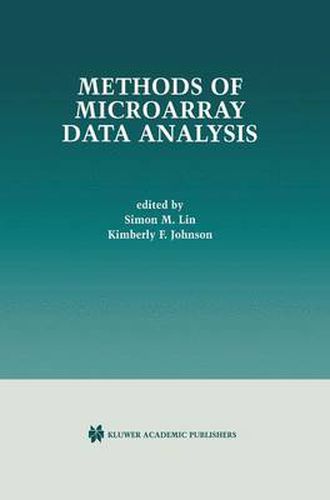Readings Newsletter
Become a Readings Member to make your shopping experience even easier.
Sign in or sign up for free!
You’re not far away from qualifying for FREE standard shipping within Australia
You’ve qualified for FREE standard shipping within Australia
The cart is loading…






This title is printed to order. This book may have been self-published. If so, we cannot guarantee the quality of the content. In the main most books will have gone through the editing process however some may not. We therefore suggest that you be aware of this before ordering this book. If in doubt check either the author or publisher’s details as we are unable to accept any returns unless they are faulty. Please contact us if you have any questions.
Microarray technology is a major experimental tool for functional genomic explorations, and will continue to be a major tool throughout this decade and beyond. The recent explosion of this technology threatens to overwhelm the scientific community with massive quantities of data. Because microarray data analysis is an emerging field, very few analytical models currently exist. Methods of Microarray Data Analysis is one of the first books dedicated to this exciting new field. In a single reference, readers can learn about the most up-to-date methods ranging from data normalization, feature selection and discriminative analysis to machine learning techniques.
Currently, there are no standard procedures for the design and analysis of microarray experiments. Methods of Microarray Data Analysis focuses on two well-known data sets, using a different method of analysis in each chapter. Real examples expose the strengths and weaknesses of each method for a given situation, aimed at helping readers choose appropriate protocols and utilize them for their own data set. In addition, web links are provided to the programs and tools discussed in several chapters. This book is an excellent reference not only for academic and industrial researchers, but also for core bioinformatics/genomics courses in undergraduate and graduate programs.
$9.00 standard shipping within Australia
FREE standard shipping within Australia for orders over $100.00
Express & International shipping calculated at checkout
This title is printed to order. This book may have been self-published. If so, we cannot guarantee the quality of the content. In the main most books will have gone through the editing process however some may not. We therefore suggest that you be aware of this before ordering this book. If in doubt check either the author or publisher’s details as we are unable to accept any returns unless they are faulty. Please contact us if you have any questions.
Microarray technology is a major experimental tool for functional genomic explorations, and will continue to be a major tool throughout this decade and beyond. The recent explosion of this technology threatens to overwhelm the scientific community with massive quantities of data. Because microarray data analysis is an emerging field, very few analytical models currently exist. Methods of Microarray Data Analysis is one of the first books dedicated to this exciting new field. In a single reference, readers can learn about the most up-to-date methods ranging from data normalization, feature selection and discriminative analysis to machine learning techniques.
Currently, there are no standard procedures for the design and analysis of microarray experiments. Methods of Microarray Data Analysis focuses on two well-known data sets, using a different method of analysis in each chapter. Real examples expose the strengths and weaknesses of each method for a given situation, aimed at helping readers choose appropriate protocols and utilize them for their own data set. In addition, web links are provided to the programs and tools discussed in several chapters. This book is an excellent reference not only for academic and industrial researchers, but also for core bioinformatics/genomics courses in undergraduate and graduate programs.